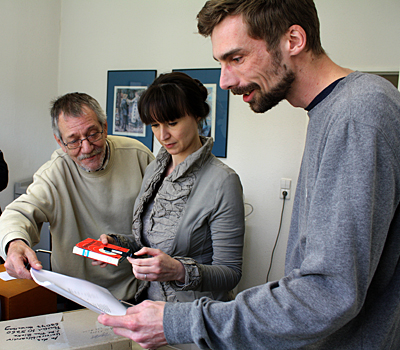The Language of the Akha: Struggling Not to Forget
The University of Heidelberg Archives and the Max Planck Institute for Psycholinguistics jointly delve into audio recordings, word lists, and photos of the ethnologist Friedhelm Scholz.

The language of the Akha must not be forgotten: from left to right, Dr. Volker Thewalt and Sabrina Zinke (both from the University of Heidelberg Archives) and Jeroen Geerts from the Max Planck Institute (MPI) for Psycholinguistics in Nijmegen. Photo credit: Michael Schwarz
The University of Heidelberg Archives is currently starting a cooperation with the Max Planck Institute (MPI) for Psycholinguistics in Nijmegen on audio tapes and cassettes from the years-long research of Heidelberg ethnologist Dr. Friedhelm Scholz on the language of the Akha. Scholz, who died in 2000, conducted research between 1964 and 1993 at the University of Heidelberg's South Asia Institute (Südasien-Institut). At the MPI, a specialist of North Thai languages will digitalize and process the tapes. Word lists, spoken accounts, and a vast number of photos from Friedhelm Scholz's legacy concerning his work with the Akha will be made available by the University of Heidelberg Archives.
Collaboration between the University Archives and the language archive of the MPI, which devotes itself to the collection of critically endangered languages, is mutually advantageous; the MPI obtains valuable additional tape material on the language of the Akha, and the University Archives in return receives the digitalized tape files for its collection at the bequest of Friedhelm Scholz. The Heidelberg ethnologist had dedicated himself for decades to the investigation and documentation of this Northern Thai language.
After the MPI's digitalization process is complete, digital copies can then easily be made available to interested researchers. Alongside thousands of index cards and written notes pertaining to the Akha language, the legacy of Friedhelm Scholz also contained hundreds of riddles, fairytales, and myths of the Akha. Without digitalization, it would not be long before analysis of the tapes by the Archives would be impossible; compatible playing devices for the tapes are quickly becoming unobtainable and the cassettes and tapes are already undergoing a natural aging process that in the near future will make the material impossible to use.
The Akha are one of the most populous mountain tribes of South Asia. They originated in the borderlands between Myanmar and the Chinese province of Yunnan, and finally settled in Northern Thailand, Laos, and Vietnam. The Akha language belongs to the Sino-Tibetan family of languages and exists only as oral tradition, without a written form.
Scholz (1928-2000) began studying Ethnology and Prehistory in Cologne, Germany in the mid-1950s, where he earned his doctorate in 1962. From 1962 to 1964 he worked in Cologne as an adjunct at the Museum for Ethnology (Museum für Völkerkunde) and at the Swiss Museum for Ethnology (Schweizer Museum für Volkskunde) in Basel, Switzerland. In Heidelberg, he was an academic advisor at the South Asia Institute's Ethnology.
The Max Planck Institute for Psycholinguistics conducts first and foremost foundational research in the field of Linguistics. It is a globally recognized center for language studies that, with its international archive of threatened languages, offers a crucial contribution to the preservation of humanity's shared cultural heritage.
Links:
Friedhelm Scholz: http://www.germananthropology.com/short-portrait/friedhelm-scholz/334
MPI/Threatened Languages Archive: http://tla.mpi.nl/
Filmprojects: http://www.seg-sse.ch/pdf/CatalogueSSE_en.pdf
Link in Thailand to IDW, Institut für den wissenschaftlichen Film:
http://www.sac.or.th/databases/ethnographic_film/main.php?str=detail&id=9


